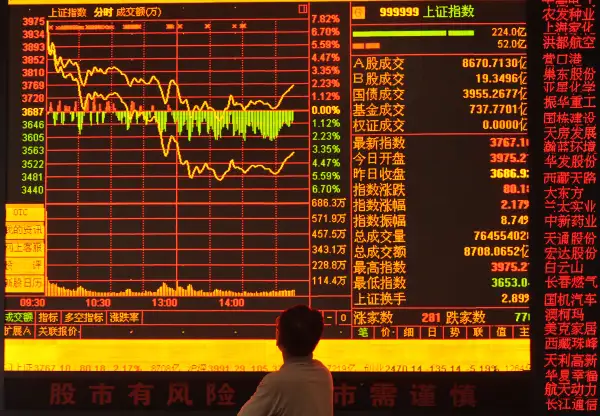How China's Stock Market Crash Affects You
Money is not a client of any investment adviser featured on this page. The information provided on this page is for educational purposes only and is not intended as investment advice. Money does not offer advisory services.

At first glance, it may not seem as if troubles in China directly impact you.
For instance, the Vanguard Total International Stock fund, a popular way for investors to gain exposure to overseas stock, currently holds less than 4% of its assets in Chinese equities. Assuming you keep one quarter of your stock investments in foreign funds like this—which is a big assumption, as Money's Taylor Tepper points out—that would mean China at most affects about 1% of your strategy.
Hardly worth mentioning...until, that is, you start considering the indirect impact of China.
#1) The role of Chinese consumers.
Not only is China the second biggest economy in the world, its households have finally started to have a major impact on global consumption. Right now, companies in the Standard & Poor's 500 index of U.S. stocks generate more than 40% of their sales overseas, with Asia Pacific (led by China) accounting for about 8% of revenues.
But for some big American companies, the numbers are actually much, much higher. Right now, around 40 companies in the S&P 500 routinely break out their revenues specifically from China, according to Bloomberg. And Bloomberg reported that those firms — led by companies such as Intel and Yum! Brands — generate more than 18% of their overall sales from this one market.
The trouble is, as powerful as Chinese consumers are, they've just been hit with not one, but two market crashes in rapid fire succession.
The first was in the country's over-developed real estate market, which accounts for around 15% of the Chinese economy. For nearly a year now, home prices in China's major cities have precipitously fallen. This has put serious pressure on Chinese consumers, since around two thirds of the typical Chinese family's wealth is tied to their homes.
When housing started going bust, Chinese investors shifted gears and started to pour their money into the stock market, which helps explain why the Shanghai composite index soared in the 12 months through mid June:
That is, until the Chinese market started selling off, and investors lost around a third of their investments in equities in less than one month's time:
How big was this sell off, given the size of the Chinese market? Ken Peng and Steven Wieting of Citi Private Bank say that so far, the sell off has erased $3.3 trillion worth of wealth. "For perspective," they say, "the value wiped out is equivalent to 14 times Greece’s GDP."
#2) The impact on the dollar.
The crisis in China—coupled with the separate debt crisis in Greece—is already being felt by U.S. investors through the dollar. Since the Shanghai market started crashing in mid June, the U.S. dollar has gained 3% in value against global currencies, as investors seek shelter in the relatively safety of the U.S. economy.
A strong currency sounds like a good thing. But it raises the prices on goods that U.S. exporters sell abroad, crimping their sales and profits.
Even before this bounce in the dollar, U.S. companies have been having trouble lately at generating profit growth thanks to the already strong buck. As the dollar has risen in general in the past year or so, S&P 500 profit growth has slowed from a pace of around 10% last year to less than 1% this year.
If China's market continues to plummet, expect more investors—including the Chinese themselves—to seek refuge in U.S.-denominated assets such as Treasuries, stocks, and just plain cash.
And if that's the case, it will be that much harder for U.S. companies to boost their profits. And ultimately, that's trouble for U.S. stocks.
Read next: 3 Charts That Explain the Stock Market’s Correction
//cdn.playbuzz.com/widget/feed.js
